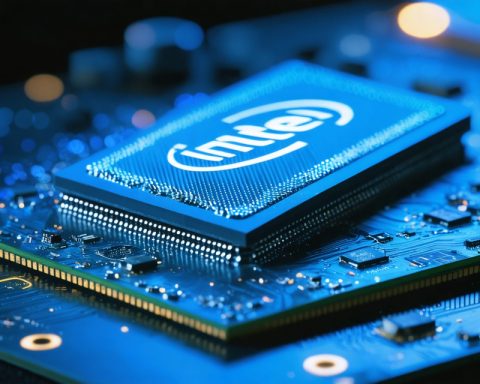The Semiconductor Struggles of a Tech Giant
Samsung is navigating one of the most tumultuous periods in its history, primarily due to significant setbacks in its memory and semiconductor operations. Over the past six months, the South Korean tech giant has witnessed a considerable drop in its stock prices, prompting a desperate search for solutions.
In a strategic shift, Samsung has decided to link employee bonuses directly to its stock performance. Reports outline that the stock component of these annual bonuses may range from 50% to 100%, depending on an employee’s seniority. Previously, bonuses were distributed solely in cash, making this change a noteworthy departure. As a result, if the company struggles, employees will not only receive fewer shares but also see the value of their bonuses diminish alongside the stock’s performance.
Samsung plans to implement a restriction that prevents employees from selling their shares for a period of 1 to 2 years, depending on their position. This initiative begins this month for executives and is slated to extend to non-executive employees by 2026.
Despite these efforts, Samsung’s deteriorating position in the semiconductor industry raises concerns. Substantial investments have failed to close the gap with competitors like TSMC, leading to a loss of key clients and difficulties in delivering high-performance chips. The company’s once-commanding lead in memory production has also waned, as it struggles to meet demand and maintain technological superiority over rivals like Micron and SK Hynix.
Challenges and Opportunities: The Broader Impact of Semiconductor Struggles
The upheaval within Samsung’s semiconductor operations is not merely a corporate concern; it resonates deeply across the global economy and societal fabric. As one of the largest semiconductor manufacturers worldwide, Samsung’s troubles highlight the fragility of the interconnected tech landscape. A decline in Samsung’s productivity could impede the supply chain for myriad industries relying on chips, from smartphones to automotive sectors, putting millions of jobs at risk.
Moreover, the impact of Samsung’s strategies—tying employee bonuses to stock performance—could signal a paradigm shift in corporate culture, especially in the tech industry. The shift to performance-based incentives reflects an increasing trend of aligning employee interests with shareholder expectations, potentially redefining workplace motivation. However, this could foster a more volatile work environment where job satisfaction is increasingly linked to fluctuating market conditions.
On the environmental front, the semiconductor industry’s intensive resource usage—such as water and energy—raises questions about sustainability. As competition heats up, companies are pressed to mitigate their carbon footprints, setting important precedents for environmental responsibility in manufacturing practices.
Looking ahead, the semiconductor industry may soon see a convergence of innovation and sustainability, as firms strive to outpace competitors while facing growing regulatory pressures. This tension might well dictate future trends in the tech sector, ultimately reshaping both market dynamics and societal expectations surrounding corporate responsibility.
Samsung’s Strategic Maneuvers: Navigating the Semiconductor Crisis
Overview of Samsung’s Current Situation
Samsung Electronics is facing unprecedented challenges within its semiconductor and memory chip divisions. Amid declining stock prices and increasing competition, the South Korean tech giant is employing new strategies to stabilize its operations and motivate its workforce.
Employee Incentives Linked to Performance
In a bold shift designed to align employee interests with company performance, Samsung is now linking bonuses to its stock valuation. Reports indicate that bonuses for employees may be derived significantly from stock options, with the proportion ranging from 50% to 100% based on seniority. This change aims to create a vested interest among employees in the company’s stock market success, but it introduces a level of risk, as poorer performance could diminish the value of bonuses substantially.
Restrictions on Stock Sales
To bolster this new incentive structure, Samsung is introducing a mandatory holding period for employees. Executives will face a restriction on selling their shares for 1 to 2 years, with plans to extend this to non-executive employees by 2026. This strategy is intended to encourage employee retention and faith in the company’s long-term recovery, compelling staff to think beyond immediate values.
Challenges in the Semiconductor Market
Despite these internal strategies, Samsung’s semiconductor division is grappling with fierce competition. Companies like TSMC have gained significant market share, and Samsung has lost several key clients, making it difficult to maintain technological leadership in high-performance chips. The firm is also struggling to meet the evolving demand for memory production, which has been exacerbated by supply chain issues and shifting consumer preferences.
Comparative Analysis of Competitors
1. TSMC vs. Samsung: TSMC has outpaced Samsung in advanced manufacturing technologies, particularly in the production of smaller, more efficient chips. Their focus on high-end chip manufacturing has allowed them to secure contracts with tech giants, creating a substantial gap between the two companies.
2. Micron Technology and SK Hynix: These competitors have also been proactive in adapting to market demands, which places additional pressure on Samsung as it seeks to recover its once-dominant position in memory chip production.
Future Predictions and Trends
The overall semiconductor market is expected to evolve rapidly due to advancements in AI, 5G technology, and IoT devices. Samsung needs to innovate continuously while also improving operational efficiency to regain its competitive edge. Industry analysts predict that firms focusing on specialized chips for emerging technologies will have a significant advantage, and Samsung must pivot towards these segments to reclaim its market share.
Conclusion: Samsung’s Road Ahead
As Samsung navigates this challenging period, the company’s shift to performance-linked incentives may help foster a more committed workforce. However, substantial external challenges remain, and the need for innovation and adaptation in semiconductor technology is paramount. The upcoming years will be crucial for Samsung to demonstrate resilience and reclaim its status as a leading figure in the tech industry.
For more insights into technology and innovation trends, visit Samsung’s official website.



















